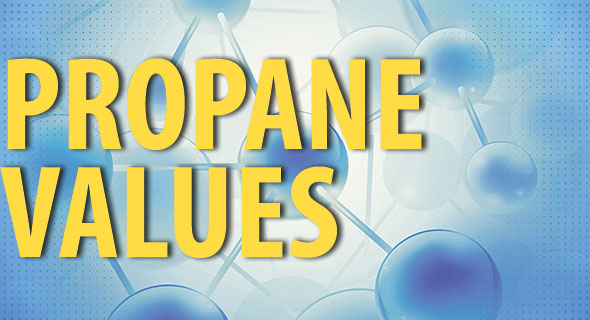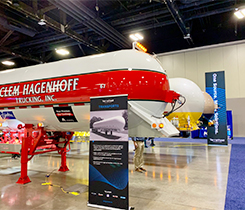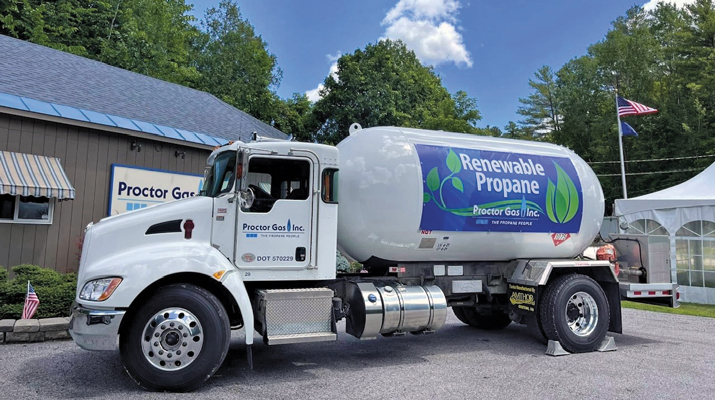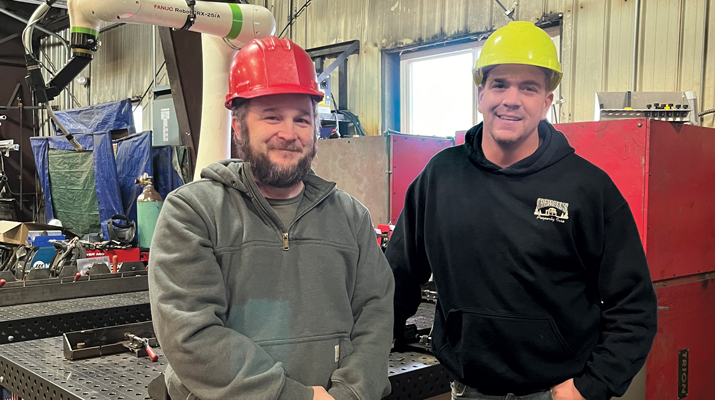2016-17 State of the Industry
The employees at Linden’s Propane went through a unique exercise a year and a half ago, crafting a list that collectively reflects the values they hold most dear as company representatives.
The list, which employees proudly labeled the “Ten Commandments for Customer Relations,” hangs prominently in the lobby at Linden’s Propane in LaGrange, Ohio. Among the company’s commandments are reminders such as the customer is never an interruption to your work; remember, the customer pays your wages; and always go the extra mile.
“It’s absolutely from the heart of the employees,” says Frank Edwards, general manager at Linden’s Propane. “It showcases to the customer what this company thinks about them.”
Through the commandments, employees impart the notion that every customer matters. No customer is merely a number impacting the company’s bottom line. Everyone is valued.
“It’s about treating someone as a human being and respecting them from that aspect,” Edwards says. “It’s not just a transaction; it’s not just a sale. Sometimes, it’s talking with the older lady whose husband passed away who just wants someone to talk to.”
It’s living one’s values or, in the industry’s circle, living one’s propane values. It’s living values such as commitment, pride and reliability, all of which Edwards cites as at the core of Linden’s Propane. They’re values such as fairness, family, integrity, safety and service, many of which define the people of the propane industry.
“Propane businesses were founded on grassroots values by our grandparents,” says Wes Welch, president of WelchGas in northeast Texas. “For the most part, small independent marketers still hold those values.”
Most propane customers have retained those grassroots values, adds Wade Edington, general manager at North Idaho Propane in Hayden, Idaho. The majority of people are still good at heart, he says. But it is increasingly more difficult to see the good in people considering the emergence of new political, cultural and generational ideals.
The values retail propane companies have traditionally cherished are eroding around them, LP Gas magazine learned in a State of the Industry survey of 100 retailers, three-quarters of whom sell 5 million gallons of propane or less per year. Propane retailers have seen the demise over the years, and it’s unsettling for a number of them to bear.
“We’re not going to be able to go back to the old days,” Edington says. “The younger generation of which I’m no longer a member has grown up with a different set of [values], but it’s been this way for hundreds of years. Every generation has a different set of rules, ways or morals. It’s not their fault; it’s what they grew up on.”
Undoubtedly, the propane industry is at a crossroads of sorts, but retail propane companies aren’t the only ones anxious about the future. Small business owners everywhere view ongoing changes as threats, so retailers can take some comfort in knowing their experiences are not unique.
“It’s not just the propane industry [that’s affected],” says Rick Levinson, CEO at SchagrinGas, a company with multiple retail locations in the Mid-Atlantic. “People are just nastier today. They want everything now.”
Changing attitudes
Levinson can’t point to a single source for the demise of the values still embodied by the propane industry. Expert sociologists probably can’t point to one changing event, either. The devolution of traditional values is one that likely has persisted over time.
Still, as Levinson reflects, he considers the events leading to the subprime mortgage crisis of the late-2000s as a root of the way business is done today.
“People were buying homes they shouldn’t have been in, and then they got mad that they couldn’t afford their [propane] bill,” Levinson says. “They stooped to a lot of tricks to get around it. They cut the lock off their tank – we’ve seen it, and it’s a shame.”
Such tactics are especially shameful considering propane retailers have taken a handshake approach to doing business for the better part of a century. The notion of “my word is my bond” is woven into the fabric of retail propane companies across this nation.
But today’s customers are more likely to reject that principle than those of yesteryear, according to some retailers.
“Our society is going in a direction where nobody has to take responsibility and nobody is held accountable,” Welch says. “In our industry, we’re held accountable every day for what we do. We’re held accountable by our customers and by our values.”
Shannon McWhorter, president and CEO of Sequoia Gas Co. in northern California, attributes some of the demise in general accountability to millennials and the principles for which some stand.
“The millennials are more of a ‘me’-type of person who doesn’t think about the big picture, such as the community as a whole,” McWhorter says. “It’s more about what’s in it for me. They don’t have loyalty to whoever their vendors happen to be. And it’s not just for propane; it’s for anything.”
A new normal?
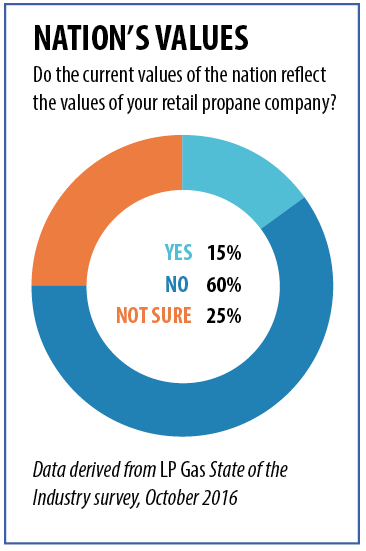 The me-first nature of some propane customers can be costly for retailers, Levinson adds.
The me-first nature of some propane customers can be costly for retailers, Levinson adds.
“I’ve been in the business for 43 years, and I’ve never seen the type of problem children we run into where people move into the home, don’t pay for the gas or claim they own the tank and then you have to take them to court,” he says. “It happens more often than not.”
Such events happen frequently enough that Levinson has committed two employees to credit and collections at his 105-employee company.
“All they do is credit,” he says. “One woman’s specialty is going to court. Oftentimes we have to use an attorney, which is costly. But we don’t want to lose.”
Even if customers aren’t the ultimate problem types, price is suddenly the only factor of worth to some propane customers across the United States. These customers aren’t interested in building or maintaining a relationship with their propane provider. They simply want propane at the lowest price. Many don’t even consider the level of service – or the lack of it – that they’re getting at ridiculously low prices.
Unfortunately for the industry, some propane providers are willing to indulge these customers beyond extremes, offering prices that their competitors describe as unsustainable to those businesses.
Todd Miller, manager of finance and administration at White Mountain Oil & Propane in North Conway, New Hampshire, is among those encountering such a market environment.
“These aren’t just new companies,” Miller says. “Some older companies are lowering themselves to those standards. Some of the larger operators are beginning to operate in ways that are going to give the industry a bad name.”
Don’t get Miller wrong. He’s a proponent of competition, referring to it as a “wonderful thing” and “essential” for the industry. But some competitors are doing business in a manner that threatens to tarnish what has historically been a good reputation with the consumer.
“We always had a situation where the competition was stiff, which is great,” Miller says. “But it was professional, with everybody’s best interest in mind. If you took one of my customers, then let’s trade tanks. The competition was relatively friendly and, more importantly, very professional.”
That sort of competition is lacking today, Miller adds.
Chad Gregg, regional manager at Enderby Gas in Krum, Texas, is experiencing similar market conditions north of Dallas.
“Smaller companies are pricing all over the market,” he says. “With a normal fuel price of $1.65 [per gallon], they’ll come in and snag your customer for $1.40. Customers will change for a quarter a gallon, but right after [the competitor] makes a couple of deliveries they’ll be back up to $1.85. Then you have to go capture that customer again.”
Such practices don’t bode well for the industry’s reputation, Miller adds.
“Unfortunately with the change in consumer behavior I see a lot of companies beginning to lower their standards,” he says.
Reflections
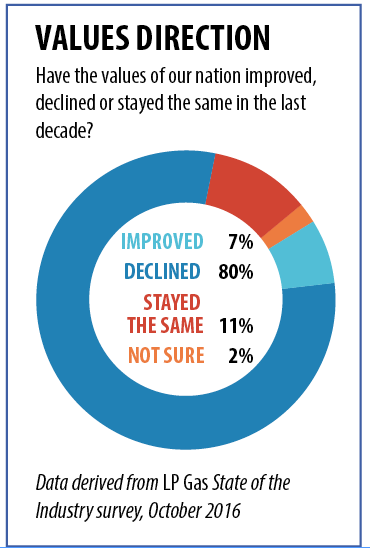 Low standards are arguably borne out of low values. For if price is everything, what worth can be applied to propane values such as fairness, integrity, reliability and service?
Low standards are arguably borne out of low values. For if price is everything, what worth can be applied to propane values such as fairness, integrity, reliability and service?
Propane retailers upholding traditional values say they are concerned about the industry’s future as it relates to the nation’s changing values.
In fact, the LP Gas magazine survey of 100 retailers found that 75 percent of companies are concerned about the direction of the nation’s values as it relates to their retail propane operation. Nineteen percent have no concerns about their company’s values being out of sync with the nation’s values, and 6 percent of retailers aren’t sure if they should be concerned.
Retailers are vocal on the matter, as well, sharing a number of sentiments on the direction of the nation’s values in the LP Gas survey.
Among the responses, which retailers submitted anonymously, are:
■ “Everyone wants a handout these days, and you can’t run a business on handouts.”
■ “People want cheap, not quality.”
■ “The marketplace has become more transient over the last 20 years. It’s interesting to see the next generation valuing small/local business over large corporate structured models.”
■ “As more states legalize marijuana, hiring and keeping employees who can comply with Department of Transportation regulations will be challenging.”
■ “Nobody values hard work and loyalty anymore. It’s harder to keep the small-town family business afloat without running it like some do and treating our customers like anything more than dollar signs.”
■ “Morality is at a low. Individualism has taken the wheel.”
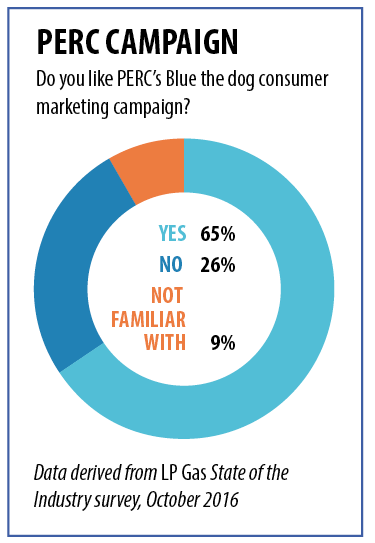 As retailers reflect, they also largely agree the nation’s values have declined over the last decade. Eighty percent tell LP Gas that U.S. values have spiraled downward over the last 10 years. Eleven percent say American values are the same today as they were a decade ago, and 7 percent say our values have improved over that timespan.
As retailers reflect, they also largely agree the nation’s values have declined over the last decade. Eighty percent tell LP Gas that U.S. values have spiraled downward over the last 10 years. Eleven percent say American values are the same today as they were a decade ago, and 7 percent say our values have improved over that timespan.
A sample of survey comments offers some depth on why propane retailers feel the way they do:
■ “Loyalty and safe service are not the mindset of the general public today.”
■ “When we first went into business, other companies wouldn’t fill our tanks and customers had pride in keeping their bills paid.”
■ “A decline in our values as a nation is due to several factors ranging from education to restrictions on parenting styles.”
■ “Unfortunately, the media and TV [as a] whole have declined drastically.”
■ “The internet and social media have created a disconnect.”
■ “[There’s] less cooperative consideration for the views of others that has led to increased divisiveness.”
■ “The low points of the nation are highlighted and all of the good things get brushed under the rug.”
Promoting propane’s story
Propane retailers have a unique opportunity to project onto the public an image of their collective self – one that reflects the propane values so many in the industry embrace – with the Propane Education & Research Council’s (PERC) national consumer education campaign featuring Blue the dog.
Research related to the campaign’s development revealed that consumers in propane country value certain ideals. These consumers value their way of life, their land and independence.
Considering those factors, the campaign is designed to depict how propane fuels the way of life in propane country. A new banner, “Proudly Propane: Clean American Energy,” supports the industry’s messaging.
So far, propane retailers are supportive of the multimillion dollar campaign, which launched earlier this year and will continue again in 2017. When asked whether they like it, 65 percent of retailers tell LP Gas that they do.
“We’ve had a good response,” says Dave Bertelsen, the national propane product manager at Matheson, which is headquartered in Basking Ridge, New Jersey. “It’s a feel-good story, and that carries into conversations that can lead to what we can do for customers.”
Not everyone is a proponent of Blue the dog, though. Some retailers have had a lukewarm or negative response to a dog being propane’s spokesperson. Twenty-six percent of retailers tell LP Gas they do not like the campaign, with 9 percent indicating they are not familiar with it.
“I love dogs, but it’s just kind of hokey,” Levinson says. “We need to lend an air of sophistication to propane, not that it’s an old rustic tank behind a barn with a good ole coonhound on the steps.”
Other retailers anonymously offered comments about the campaign in an LP Gas survey. Here’s a sample of some sentiments retailers shared:
■ “[It’s] wholesome. Who doesn’t like a dog?”
■ “The dog connects.”
■ “At least it is starting to get the propane message out.”
■ “Just not sure using a dog is the best way to get our industry message across.”
■ “I would have rather seen a talking bobtail or something along the lines of an entity that can be correlated with our industry more easily.”
■ “Everybody likes dogs.”
What’s next?
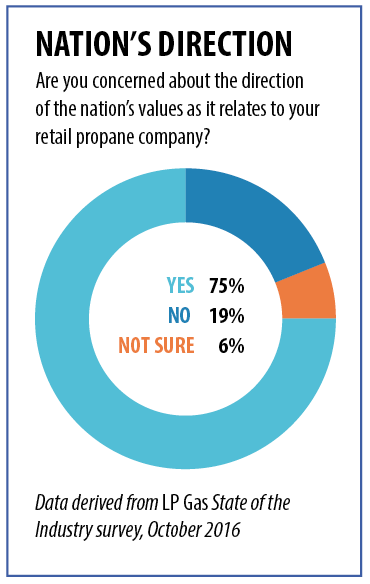 So what does the future hold for propane, an industry whose grassroots values are at odds with a number of new, emerging ideals? Should your takeaway be doom and gloom regarding the direction of the nation? Or is there reason for optimism in the years ahead?
So what does the future hold for propane, an industry whose grassroots values are at odds with a number of new, emerging ideals? Should your takeaway be doom and gloom regarding the direction of the nation? Or is there reason for optimism in the years ahead?
Undoubtedly, propane retailers are divided on their feelings moving forward. Three in 10 retailers tell LP Gas they’re optimistic about the direction of the nation as it relates to their retail propane company and the industry as a whole; four in 10 retailers say they are pessimistic; and another three in 10 indicate they aren’t sure how to feel.
Dennis St. Aubin, propane sales and equipment manager of the West region at CHS Inc., is one retailer who’s optimistic about the future. He argues that a national return to ethics and integrity will come.
“We’re in a pendulum swing,” St. Aubin says. “We’ve pushed it so far in the progressive world to get it to a point of it being uncomfortable. Grassroots is bringing the pendulum back, which will help us find that balance.”
St. Aubin is also optimistic about millennials and their potential to impact the propane industry for the better.
“Within CHS, I’ve seen a number of millennial-aged people with very strong core values that align with Generation X,” he says. “I believe we’re going to be just fine. I believe they learn differently and work differently. We have to adapt practices that they’ve become accustomed to.
“They might want it quicker, but I’ve come to appreciate how hard they’re willing to work,” St. Aubin adds. “They work right alongside the people who have been there 10 or 15 years. They want to learn. They are inspired.”
Brian Buschur, manager at McMahan’s Bottle Gas in Dayton, Ohio, sees potential in millennials, as well.
“I think they’re willing to work hard,” Buschur says. “What drives them is going to be different than what drives me. They value their independence more. They like technology. They’re used to communicating through devices. We’ve got to use that to our advantage.”
But in terms of values, propane retailers should continue to live by their grassroots ideals.
“As a company, you should stand up for your values and move forward,” McWhorter says.








